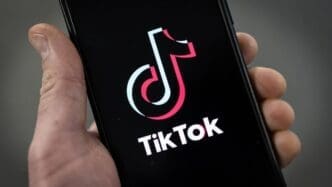In a legal showdown, TikTok’s future in the United States hangs in the balance. The popular video app, adored by millions, faces a potential ban. What’s at stake? Free speech, national security, and the reach of digital platforms.
Upcoming Supreme Court hearings will decide if TikTok remains accessible to U.S. users. The case is stirring intense debates, with free-speech advocates and national-security proponents at odds. This legal drama is more than just about an app—it’s about the principles that govern our digital lives.
TikTok’s Day in Court
The U.S. Supreme Court is set to hear arguments on TikTok’s fate. TikTok is challenging a law that demands its divesture from Chinese ownership. Free-speech groups claim the law violates users’ rights under the First Amendment, while others cite national security risks.
Scheduled for January 10, the hearing will determine whether TikTok can block a federal law poised to ban it. ByteDance, TikTok’s parent, must sell its stake unless the court intervenes. This rapid timeline underscores the urgency and high stakes involved.
The First Amendment Debate
Sens. Ed Markey and Rand Paul, among others, argue the ban infringes on free expression. They emphasize TikTok’s role as a unique platform for storytelling and communication, especially during global crises.
Several organizations like the ACLU and Electronic Frontier Foundation submitted briefs siding with TikTok. They argue the government has shown no credible threat that justifies such a drastic measure. Over 170 million Americans could lose a vital forum for expression if the ban proceeds.
Security Concerns
Some officials are deeply concerned about TikTok as a tool for Chinese influence. They claim the app could be used for propaganda or espionage, pressing the need for stringent controls.
However, critics argue the security risks don’t justify a full ban. They suggest alternative measures like enhanced scrutiny could address concerns without infringing on speech rights.
This tension highlights a broader conflict: balancing national security with civil liberties in an increasingly digital world.
Political Perspectives
The controversy cuts across political lines. President Biden enacted the law with bipartisan backing, yet not all lawmakers agree. Dissenters worry about overreach affecting digital communication.
Some, including Sen. Mitch McConnell, view TikTok under Chinese control as a strategic threat. This view underscores an ongoing geopolitical struggle influencing legislative actions.
The debate reflects deeper issues, questioning how the U.S. navigates foreign digital influence and protects domestic interests.
Impact on Users
If the ban takes effect, many users will lose access to a beloved platform. TikTok has cultivated a vibrant community where people share, learn, and create.
Content creators, in particular, stand to lose their audiences. They fear a sudden shift to alternate platforms won’t allow the same reach or engagement.
For regular users, TikTok’s absence would mean losing a digital space filled with diverse voices and perspectives, fostering community and creativity.
Legal Arguments and Implications
At the heart of the case is whether TikTok operates as a foreign agent. Human-rights groups argue the app aids Chinese government agendas, threatening individual freedoms.
Legal experts debate the law’s scope, considering whether it’s a necessary safeguard or an overstep. The decision could set a precedent for handling global tech companies and their influence.
The outcome could reshape digital policy, influencing how future tech-driven disputes are managed within the judicial system.
Historical Parallels
The battle echoes past media censorship debates. Critics liken the ban to restricting foreign media during wartime, reflecting fears of information manipulation.
Such historical comparisons add weight to the argument against the ban, warning against mimicking oppressive regimes by limiting media freedom.
The unfolding scenario prompts reflection on how history informs current policies, urging caution in how freedom and security are balanced.
Potential Outcomes
The court’s decision will impact U.S.-China relations and tech policy. A ruling against TikTok could lead to stricter regulations on foreign tech firms.
Conversely, a decision in TikTok’s favor might embolden other apps facing scrutiny. It would reaffirm digital rights and the importance of diverse platforms.
The case remains pivotal, potentially redefining the landscape of tech governance and international relations.
What’s Next for TikTok?
Awaiting the court’s decision, TikTok’s status is uncertain. The outcome will either secure its place in the U.S. or enforce a divesture.
Amidst legal challenges, TikTok continues to expand globally. The platform aims to adapt, regardless of the U.S. verdict.
The coming months are crucial, determining if TikTok can navigate these legal hurdles and remain a staple in digital culture.
Whatever the verdict, the TikTok saga highlights key issues in the digital age. Balancing free speech with security remains a pressing challenge for policymakers.
Source: Variety







